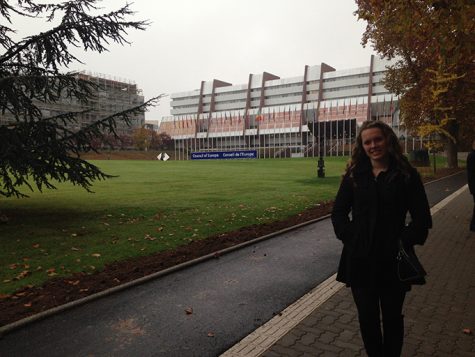Students learn world’s worth abroad
September 23, 2016
After a seven-hour-long flight, Luke Halterman ’17 was ready to begin a new journey in a foreign land, France. He landed in the southern region of the country and moved in with his new host family shortly after.
Halterman had always wanted to study abroad, and planned on going to France for university. He decided to get a head start and try a year abroad before making such a big move. Like him, Maria McCright ’19 also wanted to study abroad and traveled to France her freshman year to do so.
When she arrived in France, McCright’s host-region leader had addressed the host families for that region and told them Americans do not eat vegetables. During her second day of living in France, she ordered a salad at a restaurant. She said her host family’s immediate reaction was to ask, “Are you ok? You’re eating a salad.”

Halterman was even informed about a burger sold in France called the “American.” It consists of everything in a typical burger and then it is packed with fries in the middle. Halterman had explained to several people that, no, that is not something he has yet tried.
Including his host family, a majority of the people do not speak English in the southern part of France where Halterman is staying. Prior to moving to France, Halterman had taken up to French 4, which he believed helped but also said no class could prepare him for being engulfed in the culture. “I still feel like I can express myself when I’m talking,” Halterman said. “I just feel like a child, not being able to really say a lot of words.”
When McCright studied abroad in France she also faced language barriers. She had not taken a French class before moving. Going to a public school made communicating difficult. In her host family, the mother was the only one that spoke English. “It [was] broken English,” McCright said. “She spoke English for the first month then said ‘let’s stop.’”

But with time, McCright began to learn the language. A lot of her learning was through visual aids, like someone holding a phone and then translating it to French so she knew how to say when she needed the phone. “You pick it up like a baby,” McCright said.
Throughout her time in France, McCright traveled with her host family to different places in Europe. Her host family took her to Spain for a weekend, Switzerland for three days and Paris for the weekend to go to a concert. “[Paris] is ten times busier than Des Moines,” McCright said. “I would compare it to New York.”

At home, McCright lived on a farm with her host family. “You can’t seclude yourself in your room,” McCright said. “It’s your host family that helps you. They don’t want you to have a mental breakdown.”
Each morning, a neighbor would pick up the kids and they would all carpool to the nearest city bus stop, which would then take them to school.
McCright also had to adapt to the differences in the class schedule. In France, McCright followed a college-like schedule, what is called blocked classes here. The campus was composed of several buildings, each revolving around a different subject. The school also followed an open campus policy for all students.
In France, students are in one class together and typically stay together for the entire school day. It is similar to the way elementary schools do it here, where students travel to different classrooms but always with each other. Classes are usually either an hour-long or two hours long. Halterman and McCright both said one perk was the nearly hour-long lunch students received.
The classes were taught differently, however. Math classes were not specifically centered around trigonometry or algebra, instead the different specifics of math were combined and often taught with one another. It was based on the teacher’s personal viewpoint of what lessons and characteristics from each math blended and worked together. “Teachers aren’t there to help,” McCright said. “They’re there to give you the information and then you do it yourself.” For McCright, she was able to talk to teachers and get help. Native students received much less help than she would have.

The grading scale is a 20-point system. Getting above a 10 is deemed successful. “It’s hard to get a 15,” McCright said. “I saw one person get a 20 my entire year. Someone getting an A+ was unfathomable.” She strongly prefers the style of American education compared to what she experienced in France. After a year being back in America, she still faces the uncertainty of how her credits will transfer here.
If a student studies overseas, they must attend an “accredited school,” counselor Sue Baker said. In countries like France, it usually runs through the country to pick which schools are considered accredited, and in America it is a state-level decision.
Unlike college and university students that study abroad and do so through their schools, students that do so in high school have to go through a company. McCright went through AFS. As far as foreign students studying here in America, some of their companies might require them to study specific classes like US History or Government, and sometimes both. For Halterman and McCright, their schools picked their courses for them. “If you’re in France and you’re studying English, their English is going to be more along the lines of a second language,” Baker said. “That’s not going to count as an English credit for us.”
One issue for Halterman was the simple fact that France did not teach American Government, and he is left having to take it independently online to hopefully get the credit for his diploma.
The process for accepting and/or denying credits for students like McCright and Halterman typically takes a few weeks. If the school needs help translating, then it would usually take a while longer.
All in all, Halterman is starting his senior year in France and looking forward to the experience. McCright recently celebrated her one-year anniversary of the date she boarded the plane for France. Now that she is back, she cannot wait to go on her next adventure, possibly to an Asian country. India, Japan and Thailand were among her top picks. “You can always learn more, but I feel like I’d have a lot more fun going to a new country.”

John Steven • Oct 2, 2016 at 8:54 pm
Wow. This Maria McCright sounds fantastically smart, and incredibly bold.
Way to go, Ms. McCright!